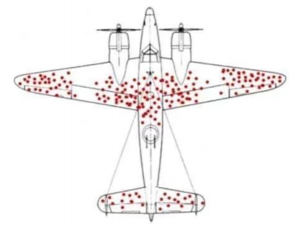This week I want to share a very impactful article about Survivorship Bias and how understanding this bias can help you make better decisions in life, business, health, and personal situations. Below you’ll find this article and my thoughts on its implications.
Disclaimer: The views and opinions expressed below are those of Mark Pew, Senior Vice President of Product Development and Marketing, and do not necessarily reflect the views of Preferred Medical.
Survivorship bias is the term used to describe our tendency to focus on and remember people or things that have passed (survived) a process or event. By doing so we often forget other important factors, such as those people or things that failed. Recognizing both is extremely important. The potential problem with survivorship bias is that it can impede your search for the root cause of the problem by overlooking important details. This form of cognitive bias can be seen in real world examples everywhere we look.

Mark’s Thoughts:
“This is a picture tracking bullet holes on Allied planes that encountered Nazi anti-aircraft fire in WW2. At first, the military wanted to reinforce those areas because obviously that’s where the ground crews observed the most damage on returning planes. Until Hungarian-born Jewish mathematician Abraham Wald pointed out that this was the damage on the planes that made it home. The Allies should armor the areas where there are no dots at all because those are the places where the planes won’t survive when hit. This phenomenon is called survivorship (selection) bias, a logic error where you focus on things that survived when you should really be looking at things that didn’t.” So here’s an important philosophical question: Do you need to change your armament focus? Whether it be in your personal or professional life, related to people or tasks, what should you focus on to become better – what worked or what didn’t? This further elaboration on survivorship bias was very helpful—”The problem with falling prey to survivorship data is that it clouds your judgment and distracts you from getting to the root cause of a problem within your personal life, your team, or your product.” This post elicited several helpful comments from a variety of perspectives and professions:
From Dottie Oliveira (nurse practitioner): “This may be my all-time favorite post of yours. I love focusing on resilience when speaking with my addiction patients. This is a wonderful way to illustrate how they can change their focus.”
From Les Kertay (psychologist): “Perfect analogy—seems to me we often throw resources at the things that are easy to fix, because it’s satisfying, or at the things that are near-impossible to fix, because they piss us off, rather than at those things in the middle that are fixable but maybe not sexy.”
From Ken Paradis (entrepreneur): “Wonderful post, Mark! Data isn’t sacred truth; its indicative measurement. Interpretation is where it all stands or falls.”
From Peter Golden (attorney): “Sometimes incorrect conclusions result in ineffective ‘corrective’ actions.”
From Carl Sisco (risk manager): “I love your post! I can’t stop thinking about how much this resonates with in-force reports. I have to say I still value data science, but it’s really important to think about the empty spaces in your data set as well.”
To read everything on my mind this past week, please visit me on LinkedIn at https://www.linkedin.com/pulse/marks-musings-october-7-mark-rxprofessor-pew/.
Until Next Week,

